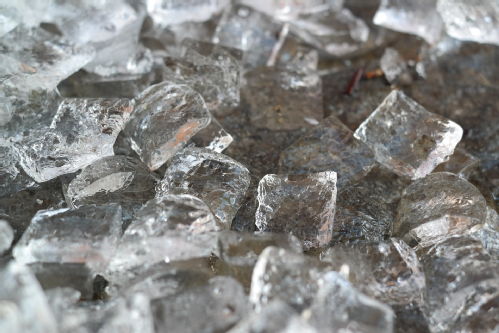Ice Ice Maybe: The potential of freezing

It’s been a bit chilly recently. In the UK, temperatures dropped dramatically. We’ve not only experienced arctic nights, but days where the temperatures didn’t trouble zero. It was worrying for those who did not have the benefit of a centrally-heated home and annoying and dangerous for commuters. But could science help us tackle these kinds of conditions in the future? Could we prevent road and rail from freezing? Could humans survive for prolonged periods in sub-zero temperatures?
It may sound like the stuff of science fiction but there are examples of animals which do have the ability to survive the deep freeze. Some frogs and toads can survive being frozen solid and some fish even have their own biological antifreeze. A researcher at Warwick is investigating the process of freezing and studying the methods used by some creatures to understand how we might use freezing to our advantage.
Chemist, Professor Matthew Gibson, is an expert on cryopreservation. He explains: “Freezing is used every day around the world - from making frozen desserts, to enabling us to store food, to be used in other months when it is scarce or to ship to other parts of the world.
“Bone marrow transplants for leukaemia patients are often frozen to store them before usage – this alone saves hundreds of lives in the UK every year. On a global scale, freezing in the atmosphere is often the first step of rain cloud formation – without which our rivers would run dry. So without doubt, it is an important process.
“But the actual understanding of what happens to water when it freezes is still under question. For example, ultra-pure water does not actually freeze until about -30 C. So, there is still a lot to be understood about how water freezes, and how to modify both its nucleation (ice formation) and growth (ice crystals getting bigger).”
This field of research came to prominence in the 1950s when Lovelock and Polge managed to freeze sperm by adding organic solvents, which prevent ice crystals from forming. Today cryopreservation is widely used, but there is still a real need to improve it. Professor Gibson’s work aims to improve the methods of cryopreservation already in use, to make them more efficient, enabling improvements in modern medicine.

The aim of my group’s research is to understand how we can mimic the function of antifreeze proteins – the specialised proteins which enable fish to survive in arctic waters," Professor Gibson continues.
“We use large synthetic molecules, or polymers, which are cheaper to make, and also highly tunable. We have shown that several synthetic polymers can behave like antifreeze proteins and stop ice crystals from growing and that by adding these to blood, we can improve its cryopreservation. This concept of cryopreservation is crucial in modern medicine – for example, donor blood can only be stored for around 35 days before it expires, and similar problems exist with other donor cells and tissues. We hope that by improving this process, we can increase the availability of these cells for medical procedures, and support the advances being made in regenerative medicine.
“The goal of my lab is to end up with a product which enables us to remove, or at least significantly reduce, the amount of organic solvent required for traditional freezing, by adding our custom-made polymers.
“This area of research has the potential to improve the availability and volume of cells and tissue available for transplantation – ultimately improving and saving lives. It could also provide new tools to improve fundamental bioscience research.
“In addition to cryopreservation, there is huge need to control ice formation on aircraft, wind turbines and of course road surfaces. There is no doubt that by fully understanding the chemical process of freezing we can solve a huge number of world problems. So next time we have a big freeze, try and think about the potential, not the train cancellations and traffic tailbacks!”
Published
Tue 7 March 2018
 Professor Matthew Gibson is a chemist who works jointly between the Department of Chemistry and Warwick Medical School. He is an expert in organic, polymer and carbohydrate chemistry and his lab sets out to address global healthcare issues, with particular relevance to regenerative medicine and infectious diseases. His work is highly interdisciplinary and he heads up a large and vibrant research group comprising of chemists, biochemists and biologists.
Professor Matthew Gibson is a chemist who works jointly between the Department of Chemistry and Warwick Medical School. He is an expert in organic, polymer and carbohydrate chemistry and his lab sets out to address global healthcare issues, with particular relevance to regenerative medicine and infectious diseases. His work is highly interdisciplinary and he heads up a large and vibrant research group comprising of chemists, biochemists and biologists.
Terms for republishing
The text in this article is licensed under a Creative Commons Attribution 4.0 International License (CC BY 4.0).
Share

